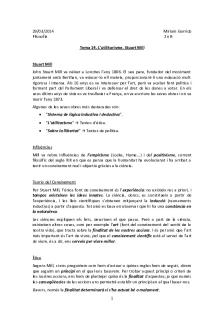Dynamic Discussion John Stuart Mill vs. Jeremy Bentham PDF

| Title | Dynamic Discussion John Stuart Mill vs. Jeremy Bentham |
|---|---|
| Course | Moral Problems |
| Institution | Texas Christian University |
| Pages | 2 |
| File Size | 53.8 KB |
| File Type | |
| Total Downloads | 10 |
| Total Views | 137 |
Summary
Download Dynamic Discussion John Stuart Mill vs. Jeremy Bentham PDF
Description
Utilitarianism: John Stuart Mill vs. Jeremy Bentham 1.
Utilitarianism a.
"Of the two great proponents of utilitarianism, Mill was the more humane philosopher, Bentham the more consistent one." i.
Jeremy Bentham: Bentham continuously stayed consistent with the greatest good for the greatest amount of people. 1.
Quantitative: Bentham believes that pain and pleasure can be put into numbers (example: willing to torture a child for the happiness of a city. The pain of the child is worth the happiness for the rest of the city).
2.
Categorized specifically a “pleasure” or a “pain,” rather than having there be some sort of grey area.
ii.
John Stuart Mill: The more humane utilitarian, who believed there was some sort of leeway. Overtime, respecting individuals human freedoms will lead to the greatest amount of happiness, because encroaching on those rights is unwarranted. 1.
Inconsistent: Varying levels of pleasures and pain. a.
Example: The Romans throwing the Christians to the lions - which shows although it’s for entertainment, it is not noble.
b.
Example: Shakespeare vs. the Simpsons (higher pleasures and moderate pleasures).
2.
Qualitative: Does not think pain and pleasure can be qualified into numbers.
3.
Morality of the situation - “case by case.” a.
However, utilitarianism is supposed to be clear cut, this makes it difficult to decipher whether or not he is a true utilitarian.
2.
Shakespeare vs. The Simpsons a.
Shakespeare is the higher pleasure (qualitative - more people think is the higher pleasure, would be considered the higher pleasure). i.
Higher Pleasures: Intellectual, animals can not experience this pleasure. Someone who has experienced it (Shakespeare) and really understands it.
ii.
Lower Pleasures: Physical and sensual, animals can experience these pleasures. 1.
Mill concedes that “occasionally, under the influence of temptation,” even the best of us postpone higher pleasures to lower ones.
2.
For Mill, individuality matters less for the pleasure it brings than for the character it reflects (51).
b.
Comparing more modern forms of pleasure: Today, there may be an argument of whether Arrested Development or Friends provides more pleasure.
c.
What does Mill mean by “pleasure?” i.
The highest pleasure is based off of the human facilities of perception, judgement, discriminative feeling, mental activity, and even moral preference.
d. 3.
Problems: Shakespeare is universally recognized as a high pleasure (hard to compare old vs. new).
Utility a.
Mill believes “it is proper to state that I forego any advantage which could be derived by my argument from the idea of an abstract right, as a thing independent of utility. I regard utility as the ultimate appeal on all ethical questions; but it must be utility in the largest sense, grounded on the permanent interests of man as a progressive being” (54).
4.
The Romans and Christians a.
The Romans threw the Christians to the lions as a form of entertainment. i. ii.
Higher Pleasures: It is providing a higher pleasure for the audience. Lower Pleasures: It is not a noble act and eventually is bad for the human race, thus, considered a lower pleasure....
Similar Free PDFs

John Stuart Mill
- 2 Pages

Utilitarianism- Jeremy Bentham
- 5 Pages

John Stuart mill - Filosofia 2 bach
- 11 Pages

Resumen Stuart Mill
- 4 Pages

Stuart Mill (apuntes)
- 2 Pages

Stuart mill biografia e teses
- 4 Pages

6. Stuart Mill - L,utilitarisme
- 16 Pages
Popular Institutions
- Tinajero National High School - Annex
- Politeknik Caltex Riau
- Yokohama City University
- SGT University
- University of Al-Qadisiyah
- Divine Word College of Vigan
- Techniek College Rotterdam
- Universidade de Santiago
- Universiti Teknologi MARA Cawangan Johor Kampus Pasir Gudang
- Poltekkes Kemenkes Yogyakarta
- Baguio City National High School
- Colegio san marcos
- preparatoria uno
- Centro de Bachillerato Tecnológico Industrial y de Servicios No. 107
- Dalian Maritime University
- Quang Trung Secondary School
- Colegio Tecnológico en Informática
- Corporación Regional de Educación Superior
- Grupo CEDVA
- Dar Al Uloom University
- Centro de Estudios Preuniversitarios de la Universidad Nacional de Ingeniería
- 上智大学
- Aakash International School, Nuna Majara
- San Felipe Neri Catholic School
- Kang Chiao International School - New Taipei City
- Misamis Occidental National High School
- Institución Educativa Escuela Normal Juan Ladrilleros
- Kolehiyo ng Pantukan
- Batanes State College
- Instituto Continental
- Sekolah Menengah Kejuruan Kesehatan Kaltara (Tarakan)
- Colegio de La Inmaculada Concepcion - Cebu








